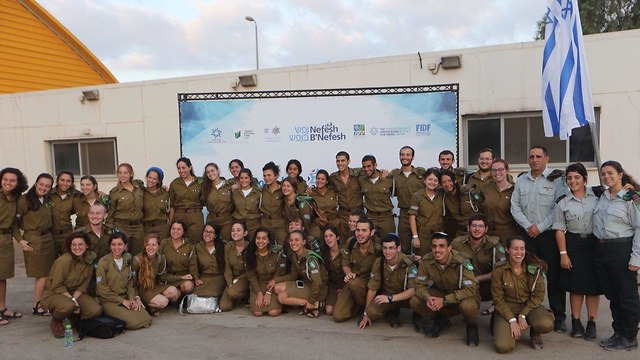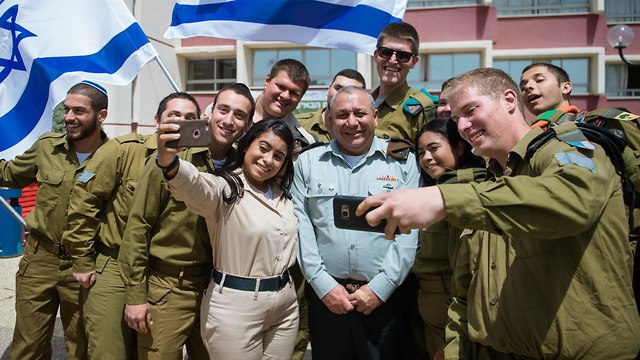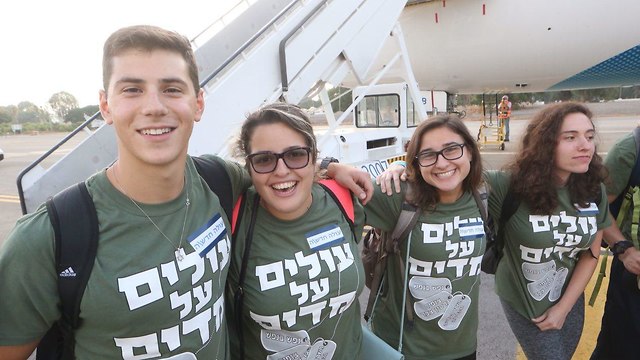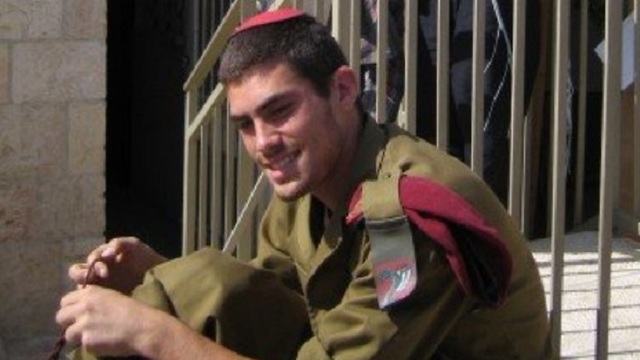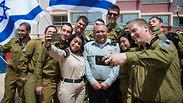
The lonely life of Israel's lone soldiers
They move to the Jewish state to serve in its army, and receive a great deal of support as they do. But a spate of suicides among IDF soldiers from abroad has raised red flags and highlighted the issues facing young people in stressful situations without their families and other support networks.
"I won't be seeing you tonight. Today, I killed myself. I'm posting this letter on Facebook to ensure there is public information about the truth. I can't change what everyone thinks of this or of me, but at least I can explain myself. The truth is that I've been very depressed with suicidal tendencies for 10 years now. Every day, I wanted nothing more than to die. It will come as a surprise to people who knew me throughout that time, and that is because I left this party of me buried deep inside and put on a mask," he wrote.
When his shocked parents, who live in New Jersey, read the post, it was too late to save their son, a lone soldier in the IDF who shot himself in the head a few hours before his suicide letter went online. A.D. prepared the post and scheduled it to go up after he ended his life, likely to stop anyone from intervening. A.D., a US national, the son of an Israeli father and an American mother, a psychiatrist, decided to enlist in the IDF and make Aliyah (immigrate) to Israel a year ago. On July 12, some five months before his suicide, the redheaded soldier posted on Facebook a photo of him in his IDF uniform and his new rank, and received 178 likes from family and friends. His grandparents wrote: "Our dear grandson, you look happy, with an honorable rank, and we're proud of you."
In his suicide letter, A.D. stressed that he was happy with his decision to enlist, that he had no complaints toward the IDF, and that it was the best and happiest time of his life. And still, he wrote, he couldn't deal anymore with the depression he has been battling with for many years, and chose to end his life.
'They become invisible'
Tzvika Graiver, the chairman and one of the founders of the Keep Olim NGO, which aids new immigrants in Israel, is closely familiar with A.D.'s case. Unfortunately, he says, depression and emotional distress are common problems among lone soldiers both during their military service and in civilian life immediately after they are discharged.Graiver says at least seven members of Keep Olim who came to Israel from abroad to enlist as lone soldiers in the IDF tragically died in recent years. Five of them, it's important to note, died in civilian life, after their army discharge, some from overdoses. "And these are just cases I know, there may be more," he says.
Graiver says he is not interested in a sensationalist discussion about the individual cases, but rather in tackling the problem itself. It's hard to determine what is the main factor in a person's decision to end his life, and what would've happened had he not made aliyah. But one thing is certain—many lone soldiers who come from abroad are in distress.
According to Graiver, a lawyer by profession, the lone soldiers encounter immense difficulties in Israel, especially after they leave the army. Suddenly they have to face things they didn't have to worry about throughout their military service: finding a job, getting a place to live, dealing with bureaucracy and the lack of a supportive framework.
"They leave the IDF to civilian life and become invisible. They don't have parents and a supportive family (in Israel), they're completely alone," he says.
"This topic is taboo, and no one will talk about it. When I wrote a post about suicide among soldiers and mentioned A.D.'s case and that of another lone soldier from California who died of an overdose, I was contacted by the IDF and asked to take the post down. The reason is they're afraid it will lead to additional cases," he says.
"Several months ago, I was accompanying the soldier's body to the airport. He died after taking an overdose, and there was a sad service near the coffin. His parents didn't tell the family how he died, there's a lot of shame attached to it."
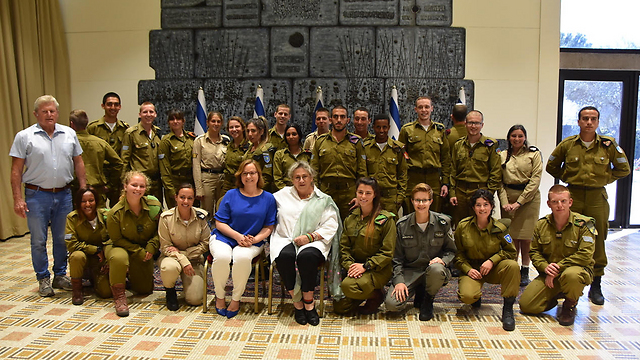
There are no accurate figures of how many lone soldiers make aliyah every year—some are Jews without any relatives in Israel, some were born abroad to Israeli parents, and some were born in Israel but moved abroad as children, and so they are considered by the IDF as Israeli natives. According to estimates, several hundred new immigrants enlist in the IDF every year.
Israel takes pride in the lone soldiers, who make aliyah because of Zionist sentiments and the need for self-fulfillment. During the 2014 war in Gaza, it was hard to ignore the relatively high proportion of the lone soldiers in combat units, their great motivation and, unfortunately, their significant number among the fallen.
'We're not sabras'
"A lone soldier is always lonely" is a sentence we heard repeatedly throughout work on this article. Tamir, 23, who has a bachelor's degree in Engineering, knows this sentence well. He tried to fulfill his childhood dream of enlisting in the IDF and starting a new life in Israel, but he failed and went back to his parents' home in London.
"For as long as I can remember, I dressed up as an Israel Defense Forces soldier every year," he says. "It was my dream as a young boy — to really enlist in the IDF. Even though my parents were not very enthusiastic about it, to put it mildly, after I finished my degree in England, I informed them: 'Mum, dad, I'm going to enlist!' I already had a plane ticket. I did all of the coordination in advance with the relevant bodies in Israel, so my parents wouldn't be able to stop me from living my dream. My sister, who is three years younger than me, was also captivated by my dreams and started preparing my parents to the idea of her enlisting too."
What happened?
"I enlisted in a combat unit, put on the uniform, and held a real weapon. But dealing with reality was different to what I imagined. This feeling of being 'alone' never left me. My friends in the unit were wonderful, embraced me as much as they could, but it never felt like I was truly not alone. Because a lone soldier, at the end of the day, stays alone every time everyone else goes home. There isn't really a home waiting for you, with a warm bed, hot food and infinite love like the home I left in London. You have to take care of everything yourself."
The state provides lone soldiers with quite a few benefits.
"It's true, there are benefits for lone soldiers. But there isn't the one thing a lone soldier misses the most, which is taking away that feeling of loneliness. That bucket just filled up more and more every day for me, until everything came pouring out and I couldn't take it anymore. I simply didn't want this loneliness anymore. Some say I gave up too quickly, that I was weak. That if I had given it more time, I would've gotten past the big crisis everyone experiences, and I would've stayed in Israel permanently. But what could I do, it didn't work out for me. I simply didn't want to be alone anymore. I didn't want to! My parents noticed how deep I was sinking into this loneliness, and left me no choice. They came and brought me back home. I wasn't the soldier I wanted to be, the one I dressed up as when I was a boy. What's more shameful — to go home or to feel lonely? I'll probably deal with this question for the rest of my life."
Unlike Tamir, A. is still optimistic despite the difficulties. Aged 20 and from the US, she is a lone soldier in active service in the Air Force. When she was young, she had to split her time between two homes, after each of her parents remarried. Eventually, though, she moved in with her grandmother.
"It was the best thing that ever happened to me," she says. "But when my grandmother passed away, I decided to make aliyah, and I'm here alone. I sleep at Beit Hachayal (a free hostel for soldiers), as well as in friends' houses. It does feel like I'm 'detached,' like I don't truly belong. And that is the problem every lone soldier experiences. I'm not alone on this issue, but I am definitely alone. There's no argument over that. Even if a friend invites me over for a Friday night dinner, it's no substitute for family."
"Every day there are new things that need to be learned here: a new country, a new language, military life that is brand new to me, making social connections. But I still have this hope for the future, to learn electrical engineering and find a good job," she says.
Dan, 24, came to Israel from the US through one of the aliyah programs and enlisted in the IDF, where he is in a combat engineering unit. His distress began manifesting itself after his army discharge.
"I had to find a roof over my head and food," he says. "I failed at the mechanical engineering preparatory course due to difficulties with the Hebrew language. Even though I speak fluently, it's hard for me to keep up with the lecturers, who talk quickly."
"I really wanted to succeed in Israeli society, to understand the mentality, to learn the Israeli bluntness. But it's not a simple task at all. You always feel lonely, no matter what," Dan says.
"The greatest difficulty was to understand all of the rights I have as a lone soldier. It was an immense difficulty that only became more and more complex in the face of all of the bureaucracy. I really didn't want to call my parents in the US and whine, they would've told me to come back home. And that is something no lone soldier wants to hear. After all, we came to Israel to succeed in a mission, not to return home with our tail between our legs. The hardest feeling is that of shame," he says.
"The feeling is that you're always missing someone to talk to, to help and guide you. And the fact I'm a shy guy doesn't really help me," he says.
Dan and A. are both getting help from the Mentor For Life NGO, which adopts new immigrant lone soldiers, mostly after their military discharge, and pairs them up with a mentor who guides them on their job search, how to deal with bureaucracy, and more. A., for example, volunteers in the NGO's "Together" project, which brings together lone soldiers and Holocaust survivors to "relieve the mutual loneliness."
In the absence of official aid from the state to the lone soldiers who made aliyah, several NGOs like Mentor For Life were founded in an effort to fill the vacuum. Itay Kanner, a senior mentor for CEOs and entrepreneurs and the founder of Mentor For Life, knows the soldiers' distress up close. Even though the NGO has paired off over 200 pairs of mentors, Kanner says it's "still just a drop in the ocean. If we could pair each lone soldier with such a mentor, I'm sure there would be less lone soldiers leaving Israel with a sense of failure. Not to mention the horrible cases that sadly ended in the loss of life."
What does a mentor do?
"We meet the lone soldier at two main crossroads. One is while he is a lone soldier in the army and the other is when he is discharged and goes out to the real world. The mentor is there for him at every moment, while he deals with this, through any doubts, difficulties and obstacles. The mentor also tries to help him in establishing a social network that strengthens the feeling of belonging."
Graiver, along with his partner LiAmi Lawrence, started the Keep Olim NGO three years ago to fill the vacuum left by the state. They decided to launch a special service to offer the help of professionals, psychologists and coachers to new immigrants in their native tongue. The response from lone soldiers was amazing, and today there are over 42,000 members of the NGO's Facebook group.
One of the volunteers in Keep Olim is Wendy Solomon Yaniv, an immigrant from Atlanta, Georgia, whose three sons served in the IDF. "The funny thing is that my sons finished their military service and went back to Atlanta, while my husband and I made aliyah a year and a half ago," she says. "I was happy when my sons enlisted in the IDF, they joined up one after the other between 2013 and 2015. Two of them served during Operation Protective Edge (the 2014 war in Gaza), and it wasn't easy for us because we were in America, far away from them.
"I supported their decision to enlist because it was important to me that they have this experience," she says. "However, I noticed there are a lot of young people from abroad who enlist in the IDF because they think the military will fix them and their problems. It's problematic, because the army at the end of the day is an army and it's not built to deal with problems like these. They recruit young people from abroad with a history of mental issues, and the military doesn't always catch it in time. It's also not fair to put all of the blame on the military and the commanders, they are kids themselves and don't always understand what loneliness and depression are."
One of the hardest things, Wendy says, is weekends and holidays. While all of their friends from the unit go home to spend time with their families, many lone soldiers stay on duty at the base because they don't have anywhere to go. Solomon says her sons spent their weekends alone at their rented apartment. "They'd get back to an empty apartment, go and buy food, and go to sleep. I was on the phone with them a lot, but it's no substitute to a family that is right there next to you and supports you," she says.
Jessica Billus, 23, from New Jersey, remembers this feeling of loneliness well. She too, like many lone soldiers, decided to leave Israel at the end of her military service, but hopes to be able to come back. "Look, I don't know any lone soldier who isn't a bit crazy. Life is easier for us here in the US, and then we go to a strange country to serve in the military. You have to be a bit crazy to do that," she says.
"I have relatives in Israel, but I didn't feel comfortable going to them all the time. It's true, there are Israeli families who host lone soldiers for holidays and weekends, but they live far away and you don't want to go to people you hardly know. It's exhausting, so a lot of lone soldiers prefer to stay at base or alone in their apartment," she says.
Billus, whose parents are American, says she has always considered herself half-Israeli, perhaps because her father lived in Israel for five years when he was a child. "I made aliyah and decided to enlist because I am a Zionist, and I told myself that if I consider myself an Israel supporter, I should enlist in the military and contribute," she says.
"But my experience was difficult. I knew friends who were in an even worse state than me: depression, going to the mental health officer. There are some who already suffer from depression when they enlist, and in the military these problems become more acute. And when you feel lonely and like a stranger, you feel like you have no one to turn to. My friend met with a mental health officer who knew English, but insisted on talking to her in Hebrew because she 'made aliyah and needs to learn.' It's hard enough to admit you need help, so expressing your feelings in Hebrew is even harder."
Mark (not his real name), who works with lone soldiers as part of one of the NGOs, was a lone soldier himself. "From my experience, there are quite a few who come here to enlist because they want to escape their former lives," he says. "But in Israel, their problems only get worse. They become depressed in the army, and a lot of the times it only gets worse in civilian life."
Graiver, the founder of Keep Olim, says his goal is not to criticize the IDF and the state, but simply resolve the problem. His partner LiAmi Lawrence agrees: "Last week I was visiting my mother in Florida, and I got messages from new immigrants who were in distress. Some threatened to commit suicide. Instead of spending my day vacationing, I had to take care of that. I became a hotline for new immigrants."
Give them strength, don't scare them
It's important to note that a lone soldier gets significant assistance from the state and the IDF: a monthly grant of NIS 1,700 as part of the absorption basket (grants given to new immigrants), regular bonuses to their military salary, a NIS 1,300 aid for rent, generous gift cards for the holidays, food baskets, discounts in paying municipal taxes, special vacations and more. The economic issues emerge mostly after their release from the military, when they have difficulty in finding a regular job.
"A lone soldier becomes a lone civilian," says Itay Kanner of Mentor For Life. "When they are discharged from the military, they fall between the cracks. There is no longer a big organization like the IDF or the Absorption Ministry to provide them with financial assistance. They start civilian life like any other Israeli who has just finished his military service, but with one additional issue: They are still lonely. This is true, conversely, even among lone soldiers who have gone on to become officers and receive a career soldier's salary. They too turn to us and ask for assistance and close guidance, even though they start off by saying: 'I know I don't deserve such assistance, because I'm an officer and I no longer have a lone soldier status'—because officers who receive a career soldier's salary are no longer characterized as lone soldiers. Perhaps it's time to change this, because loneliness is not something you can buy away with money."
It's important to Kanner to stress that there is great satisfaction in his work.
"(It is wonderful) to see a lone soldier to whom we have assigned a skilled mentor make his way into an excellent position in a high-tech company like Intel, law firms, management and so on. Lone soldiers can go very far in Israel, with the right help. We have more than a few stories like this."
Another major organization that helps is the Lone Soldier Center in Memory of Michael Levin, which was established in 2009 by a group of demobilized lone soldiers. The group were friends of Levin, a Philadelphia-born lone soldier who was killed in the 2006 Second Lebanon War. The Center provides economic and social care for lone soldiers, through six houses across the country that provide Friday night dinners, visits to the sick, counseling, guidance and more. The organization accompanies the soldiers before their enlistment, during their service and after they leave the army.
Michael Domb, deputy director of the Levin Memorial Center, prefers to look on the bright side: "I myself am a lone soldier who came from Canada. My late father was Israeli, and I enlisted in the armored corps just six years ago. I served as a tank commander, and I also do reserve duty, of course. Michael Levin had a vision to build a home for lone soldiers. For example, until 2008 there was no real support for lone soldiers. Levin fell in the Second Lebanon War and never realized his dream, but our center that was established in his name does just that.
"It is true that lone soldiers have difficulty integrating, but in my opinion, there is no better place than the IDF in which to make aliyah and be absorbed into Israeli society. For me, along with the difficulties that came with realizing my dream, I enjoyed every moment of my service. But it is important that there is a broad shoulder for lone soldiers to lean on," he says.
"The IDF is considerate and provides benefits, and the absorption basket is financially helpful during recruitment, but it is important that the state be more attentive to the individual soldiers, that more bodies rise to the challenge and help as much as possible. It pains me that there are cases in which lone soldiers take their own lives, but I am not convinced that the blame always lies with the army or the state. Unfortunately, this could have happened even if the young man had not made aliyah and enlisted. Who knows? No one really does. In America, every week you hear about students who have committed suicide, Incidentally, just last month, following the suicide of a lone soldier, we set up a fund to help prevent such cases. I also understand the mothers' worry that one day their children wake up in the morning with (the burning desire) to leave everything behind and join the Israeli army. We need to give them support that their child chose correctly and not alarm them."
The IDF said in response: "The IDF and its commanders value the lone soldiers who have chosen to immigrate to Israel and serve the state, and believe in providing comprehensive economic and psychological support to these soldiers to help them carry out their military service. In order to prevent suicides, the IDF conducts a wide range of activities, including training for soldiers and commanders, access to mental health services, mental fitness programs for combatants and so on. We would like to point out that the number of IDF suicides is decreasing and has declined dramatically in recent years."










